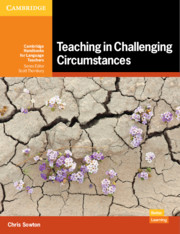Book contents
- Frontmatter
- Contents
- Thanks
- Acknowledgements
- Introduction
- I Creating a good environment for language learning
- II Being effective in the classroom
- III Teaching large classes
- IV Teaching language skills and systems
- V Teaching language without textbooks
- VI Teaching language with textbooks
- VII Helping students achieve their potential
- VIII Linking the school to the outside world
- IX Supporting yourself and others
- Glossary
- Index
6 - Managing lessons
Published online by Cambridge University Press: 22 September 2021
- Frontmatter
- Contents
- Thanks
- Acknowledgements
- Introduction
- I Creating a good environment for language learning
- II Being effective in the classroom
- III Teaching large classes
- IV Teaching language skills and systems
- V Teaching language without textbooks
- VI Teaching language with textbooks
- VII Helping students achieve their potential
- VIII Linking the school to the outside world
- IX Supporting yourself and others
- Glossary
- Index
Summary
In the high school classroom, you are … a shoulder to cry on, a disciplinarian, a singer, a low-level scholar, a clerk, a referee, a clown, a counsellor … a philosopher, a collaborator … a politician, a therapist, a fool … a mother-father-brother-sister-uncle-aunt, a bookkeeper, a critic [and] a psychologist.
Frank McCourtThe short version
1 As a teacher, you have to play many different roles. These roles can be divided into four main categories: the Knower, the Organizer, the Coach and the Carer.
2 As the Knower, a teacher may be the students’ main or only source of language information. However, teachers should still share this knowledge in a student-focused way, and use elicitation to build on students’ knowledge.
3 As the Organizer, clarity of instructions is especially important for the success of classroom activities.
4 As the Coach, teachers should know how to ask students the right questions to enable them to work out answers by themselves, and the best ways to provide constructive feedback.
5 As the Carer, teachers should be kind and professional, but be wary of being too familial. Teachers should also have techniques for dealing with behavioural issues.
Introduction
1 What kind of teacher activities would you expect to see for each of the four roles listed above?
2 Which of the four roles do you take on most often? Which role do you take on least often?
3 Look at the teaching techniques and concepts connected to these four roles below. What do these terms mean?
The teacher's various roles in the classroom
As a teacher, you need to play a range of different roles in the classroom. These can be broadly divided into the Knower, the Organizer, the Coach and the Carer. In challenging circumstances, teachers often only play (or are expected to play) the role of the Knower. However, to maximize student learning experiences and outcomes, a teacher should play all the four roles when appropriate and necessary.
The Knower
Student-focused approaches
You know things which your students don’t. In challenging circumstances, this role can be even more important as your students may have little or no access to other resources. As such, you may be their all-in-one dictionary, thesaurus, textbook and pronunciation source.
- Type
- Chapter
- Information
- Teaching in Challenging Circumstances , pp. 40 - 45Publisher: Cambridge University PressPrint publication year: 2021



